1. Julius Mutuku's Hiving venture
Julius Mutuku’s fortunes as a farmer changed for the better the day he met Anthony Musili of Biovision Africa Trust in 2015. Mutuku had invested in pure pedigree dairy cows which he bought from Githunguri Dairy Livestock Farm in Kiambu. “The dairy cows were a huge investment and I hoped to gain maximum returns but during the dry-season, I struggled to feed them as required. That is why when the idea of switching to beekeeping came to mind, I thrust myself fully into it”, he says.
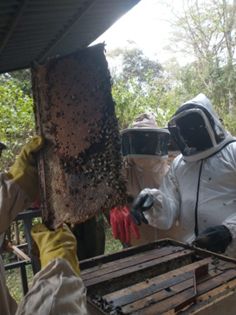
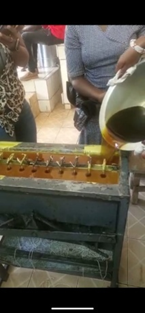
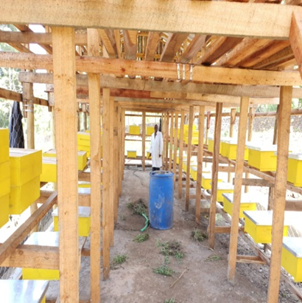
Mutuku did not have prior plans to practice beekeeping. In fact, he feared bees. However, this changed when bees raided his farm and made a hive out of a neglected plastic tin. “ When I noticed a swarm of bees in a site close to my livestock, gyrating around a tin that was disposed in the farm, I was immediately bothered and afraid that they would attack my dairy cows”, narrated Mutuku. Afraid of the stinging insects, Mutuku kept his distance while still wondering on how to get rid of them. The following day, he was expecting Musili who had been his go to person whenever he needed advise on his dairy cattle. He had come to guide him on silage making and in the process, Mutuku mentioned that he had a swarm of bees that had colonized an empty tin. All he advised was to move them to habitable structure.
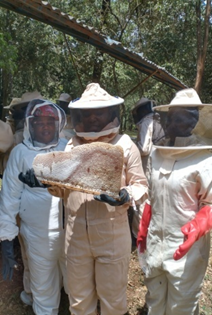

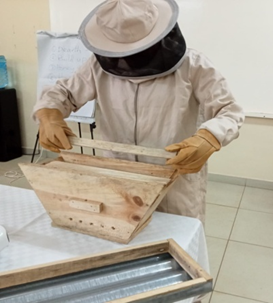
He advised him to make a wooden box and seek the help of an experienced handler to transfer them to the wooden box. Despite having been moved to the wooden box, the bees migrated back to the plastic tin. After three days, bees had colonized both hives. Later on after three months, a neighbor helped him to harvest. In the first season from two hives, Mutuku harvested five kilograms which he sold at Kshs500 per kilogram and used the remaining at home. Mutukus’ interest in beekeeping peaked and that is how his he sought to learn more about professional hive making and beekeeping as enterprise.
Due to his growing interest, he influenced the members of his farmers group to invite experts from African Beekeepers during one of their regular meetings, The experts honoured the invite and spent a session training the group on the various benefits of honey, honey products and by-products gotten when harvesting honey such as venom, bee propolis, wax, candles, oils, soaps and shoe polish.
After group training, Mutuku was invited to African Bee Keepers in Nairobi, where he was further trained on hive making. After the training, he bought a professionally made langstroth hive and took it home. Utilizing the model of the hive and the skills he acquired during the training, Mutuku made ten langstroth hives which he exhibited in Nairobi at his workshop in Umoja and Machakos where he also owns a shop. The first customer bought five hives and the second ordered ten hives more. He installed some of them in his farm bringing his total number of hives to 17.
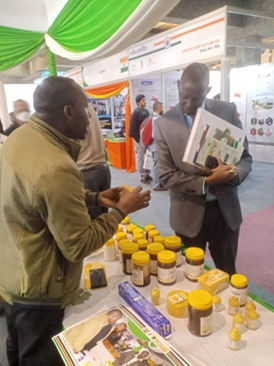
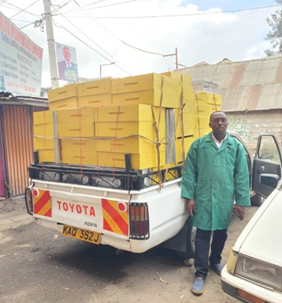
Finally during one of Mutukus’ group meeting, an officer by the name Valentine Oluoch from ATDC Katumani that is highly involved in trainings and capacity building of smes was able to approach the group to enlighten them more on bee keeping. The group that was involved in bee keeping needed a lot more training on the same to help them increase their honey harvesting and value addition on bee keeping.
Hence forth Mr. Mutuku was sponsored by Atdc Katumani to go and learn more on bee inspection, colony division, honey harvesting and value addition. Mr. Mutuku attended the one week training at National bee keeping Institute at Ngong where his bee keeping knowledge was highly empowered. From the training was able to learn more products obtained from the hives such as royal jelly, bee venom, propolis and value addition on beeswax and honey body cream, beeswax and beeswax candles. This also expanded his market to other bee keepers who were able to order more than 100 langstroth hives.
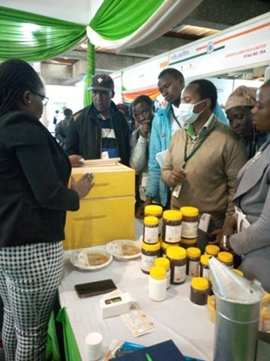
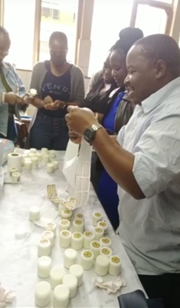
From the training, Mutuku together with Valentine attended International agro-expo at KICC in Nairobi and Machakos Agricultural show in june 2022 where they were able to display the products and offer their contacts for training of farmers. The two have been able to offer several training within Machakos, Kajiado, Kitui and Makueni counties. Bee farming has seen tremendous growth within the region and farmers have opted to bee keeping due to climate challenges within the region that leads to low crop yields. Growing demand of his services has helped Mutuku expand his business and delivery to all over the country and hence leading to its sustainability.
2. Muoo Wa Sombe (Makueni County)
Muuo wa sombe is a group based in Kambu Makueni county. The group has been in existence for over 20years and consists of 26 members (women). Main agenda was to come together to improve their livelihood by involving in different activities. The group started by doing table banking and selling of vegetables and fruits. After a period of time, having realized that their income was very minimal due to lack of diversification, they decided to start selling baobab and tamarind fruits that were in plenty in that county.
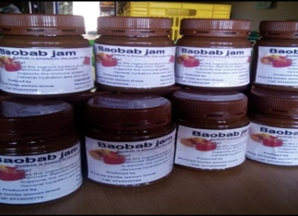
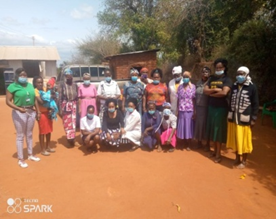
Later on the group saw the light after world vision came in and facilitated them with maize miller where they mill flour for the community and earn their income. World vision also funded training of six members of the group at yatta where they were taught on value addition of tamarind and baobab fruit to produce tamarind and baobab jam respectively.
From the training, the group started production of the baobab and tamarind jam on a weekly basis where they would produce 200 pieces of 250grams of both jams. After production, young members of the group are distributed with the jams to sell them to schools, markets and different shops. From these sells, the group was able to save and bought a tuktuk athat they use to ferry water to their area of production and also fetch water for schools and individuals at a fee and this adds to their income as well.

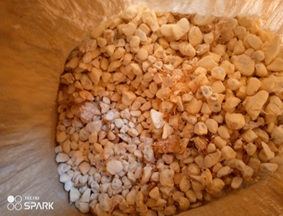
The group/company had not been registered therefore; ATDC Katumani came in and assisted in registration of the group. The demand for the two jams went up hence the production increased to 1000 bottles every week. The elephant to their sells was the kebs sticker. The groups products needs to be standardized by Kenya bureau of standards in order to be certified. From the certification the sells of the product will even go higher.
The group later on met an officer from ATDC Katumani (Valentine) whom together came in with the help of the station to register the group as first step to attaining kebs sticker. Lack of Kebs certification on the products has led to zero sell on big retail shops and supermarkets and also places their products at risk.
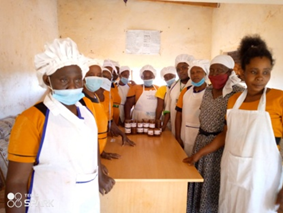
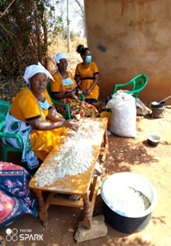
ATDC Katumani instituted the following quality control processes in keeping with KEBS requirements.
1. Permanent structure with five sections;
· Changing room. Should have stainless double sink and running tap water.
· Sorting area. This is where all the raw products are delivered and sort before production.
· Processing/production area. Main activities of heating, mixing, stirring and sieving happen.
· Cooling/Packaging area.
· Storage area. Should be free from rodents and have enough cabinets for storage.
· NB: Structure to have proper air circulation.
2. Water storage tanks and Plumbing works.
3. Sanitation - Proper toilet with running water.
4. Waste disposal area to be located distant from the structure to avoid food contamination.
5. Electricity installation in constructed infrastructure.
6. Production/processing equipment (boilers, mixers and coolants).
Processing/production steps
a. Requirements
Tamarind fruit
Baobab fruits.
Purified water
Sugar/honey
Lemon.
b. Processing procedure
|
|
Technology |
Activity Description |
|
|
1 |
Training |
Sensitizing the SME (muoo wa sombe) on important areas i.e sanitation, facilities, production, disposal, health requirements and a lot more that has to be met before their products get standardized by kebs. |
|
|
2 |
Sorting. |
Sorting of tamarind and baobab raw materials. Followed by removal of outer cover of tamarind and baobab fruits. |
|
|
3 |
Socking. |
Sock in hot water (30-60) minutes and stir to get the paste of the baobab and tamarind. |
|
|
4 |
Sieving. |
First sieve to remove the seeds and any other large unwanted particles. 2nd use a fine sieve to remove any small or fine unwanted particles. |
|
|
5 |
Heating/Boiling. |
Boiling at very low heat while stirring continuously to prevent the paste from burning. |
|
|
6 |
Sweetening. |
Immediately the paste starts boiling, add lemon, followed by sugar in the ratio 1:1 as recommended for jams and jellies (sour fruits). Lemon is to help with preservation for up to 6 months. Sugar is to add flavor and sweeten the paste. |
|
|
7 |
Cooling. |
After the paste is ready let it cool in an open air to warm temperatures and ready for packaging. |
|
|
8 |
Packaging. |
Packaging done at warm temperatures to avoid trapping of cold air bubbles and also helps in darkening of the color as it waits for distribution. |
|